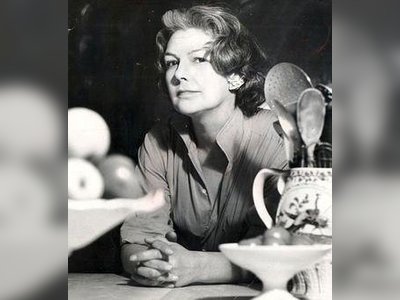British Heritage
Remember, Cherish, Learn.
beta
Giles Coren
A Prolific Voice in British Journalism and Media.
In the canon of British journalism and media, few names have made as resounding an impact as Giles Robin Patrick Coren. Known for his wit, criticism, and undeniable flair for language, Coren has made a significant contribution to British heritage through his work in print, television, and radio. His varied career has seen him champion food and drink, tread the path of controversy, and remain a steadfast influencer in the media industry.
Born in Paddington, London on 29 July 1969, Coren hails from a family steeped in journalistic tradition. He is the son of esteemed English journalist and humorist Alan Coren and the elder brother of journalist Victoria Coren Mitchell. His familial ties extend to Canadian journalist Michael Coren. The young Coren received his education at The Hall School, Westminster School, and finally Keble College at the University of Oxford, where he achieved a First Class degree in English.
Coren first joined the world of journalism as a restaurant critic for Tatler magazine and The Independent on Sunday. However, it was his move to The Times in 2002 that established his prominence as a food critic, leading to his recognition as the Food and Drink Writer of the Year at the 2005 British Press Awards. As an adept journalist, Coren’s work is not limited to food criticism. He regularly contributes columns to The Times, covering a gamut of topics from personal experiences to politics, showcasing his diverse literary talents.
Beyond the realm of traditional print media, Coren has spread his influence across various platforms. His work includes several appearances on television, and he hosts a weekly radio programme for Times Radio. Additionally, he has served as editor-at-large for Esquire and penned a regular column for Time Out, discussing city life in London.
Coren's foray into book publishing further demonstrates his versatile talents. His first novel, Winkler, was published in 2005, despite a particularly infamous section that won the Literary Review's "Bad Sex in Fiction Award". Nevertheless, Coren also found success in non-fiction writing, compiling his Times columns into a book, Anger Management (For Beginners), and authoring How To Eat Out in 2012.
On television, Coren has enjoyed a wide-ranging career, appearing on cooking and history shows alike. Notably, he co-presented the Supersizers series with Sue Perkins, where they explored historical diets and their impacts. Further, his series Back in Time for Dinner, co-presented with social historian Polly Russell, received a BAFTA nomination in the 'Features' category.
Coren's candid style, however, has not come without controversy. His acerbic wit and unabashed expression have sometimes strayed into the realm of public contention. Notably, his published email to sub-editors at The Times, filled with profanity over a minor edit, caught widespread attention and critique. His comments about the Polish community stirred significant backlash, leading to complaints to the Press Complaints Commission and the European Court of Human Rights.
Yet, these controversies have done little to dampen Coren's influence. His sharp critiques and charismatic personality have made him an influential figure in British media. He continues to wield his pen (or keyboard) with the same vigour, frequently stirring the pot with his unabashed opinions and critiques.
Giles Coren represents a quintessential British voice in journalism and media, combining sharp wit, critical analysis, and a flair for controversy that has made him one of the most recognized figures in his field. Despite the controversies he has faced, Coren’s journalistic integrity and commitment to his craft have never waned. His distinct voice and approach have contributed significantly to the richness of British media and journalism, and he has left an indelible mark on British heritage.
Through his varied career in print, television, and radio, Coren continues to be a compelling storyteller and critic, whether he's regaling audiences with tales of food and drink, city life, or his unique insights on society. His contribution to British media is significant and far-reaching, influencing not only his readers and viewers but also the future generations of journalists and writers who will follow in his footsteps.
A Remarkable Career: The Rise of Giles Coren
Born in Paddington, London on 29 July 1969, Coren hails from a family steeped in journalistic tradition. He is the son of esteemed English journalist and humorist Alan Coren and the elder brother of journalist Victoria Coren Mitchell. His familial ties extend to Canadian journalist Michael Coren. The young Coren received his education at The Hall School, Westminster School, and finally Keble College at the University of Oxford, where he achieved a First Class degree in English.
Coren first joined the world of journalism as a restaurant critic for Tatler magazine and The Independent on Sunday. However, it was his move to The Times in 2002 that established his prominence as a food critic, leading to his recognition as the Food and Drink Writer of the Year at the 2005 British Press Awards. As an adept journalist, Coren’s work is not limited to food criticism. He regularly contributes columns to The Times, covering a gamut of topics from personal experiences to politics, showcasing his diverse literary talents.
Diverse Media Presence and Intellectual Prowess
Beyond the realm of traditional print media, Coren has spread his influence across various platforms. His work includes several appearances on television, and he hosts a weekly radio programme for Times Radio. Additionally, he has served as editor-at-large for Esquire and penned a regular column for Time Out, discussing city life in London.
Coren's foray into book publishing further demonstrates his versatile talents. His first novel, Winkler, was published in 2005, despite a particularly infamous section that won the Literary Review's "Bad Sex in Fiction Award". Nevertheless, Coren also found success in non-fiction writing, compiling his Times columns into a book, Anger Management (For Beginners), and authoring How To Eat Out in 2012.
On television, Coren has enjoyed a wide-ranging career, appearing on cooking and history shows alike. Notably, he co-presented the Supersizers series with Sue Perkins, where they explored historical diets and their impacts. Further, his series Back in Time for Dinner, co-presented with social historian Polly Russell, received a BAFTA nomination in the 'Features' category.
Controversies and Incidents: The Cost of Candour
Coren's candid style, however, has not come without controversy. His acerbic wit and unabashed expression have sometimes strayed into the realm of public contention. Notably, his published email to sub-editors at The Times, filled with profanity over a minor edit, caught widespread attention and critique. His comments about the Polish community stirred significant backlash, leading to complaints to the Press Complaints Commission and the European Court of Human Rights.
Yet, these controversies have done little to dampen Coren's influence. His sharp critiques and charismatic personality have made him an influential figure in British media. He continues to wield his pen (or keyboard) with the same vigour, frequently stirring the pot with his unabashed opinions and critiques.
Coren's Legacy: A Quintessential British Voice
Giles Coren represents a quintessential British voice in journalism and media, combining sharp wit, critical analysis, and a flair for controversy that has made him one of the most recognized figures in his field. Despite the controversies he has faced, Coren’s journalistic integrity and commitment to his craft have never waned. His distinct voice and approach have contributed significantly to the richness of British media and journalism, and he has left an indelible mark on British heritage.
Through his varied career in print, television, and radio, Coren continues to be a compelling storyteller and critic, whether he's regaling audiences with tales of food and drink, city life, or his unique insights on society. His contribution to British media is significant and far-reaching, influencing not only his readers and viewers but also the future generations of journalists and writers who will follow in his footsteps.
- Giles Corenen.wikipedia.org


